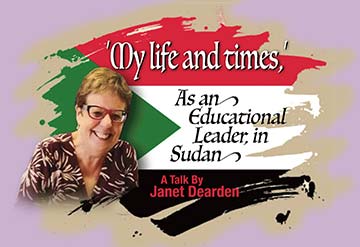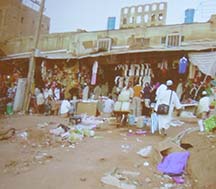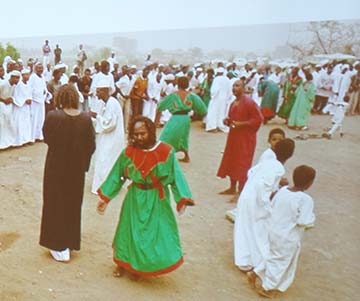
My life and times, as an educational leader, in Sudan
Speaker: Janet Dearden
Friday, 28 October 2022
The guest speaker at u3a Todmorden's September Members Meeting was Janet Dearden, with 'My life and times, as an educational leader, in Sudan'.
While she was running a language school in the UK, she received a call from a consultant in the Sudan to ask if she would teach students from there. With experience already of students from China and Japan, she said that those from Sudan couldn't possibly be more challenging. But this turned out to be wrong.

The students would usually arrive long after the dates arranged to receive them. For example, the first two young men who said they would arrive in July, entered Britain the week before Christmas with visas valid for only five days. She took the men to the Immigration office at Croydon the following day and queued for three hours before their interview. The officials wanted the bank details of the men, which posed a problem as Sudanese people worked almost exclusively with cash. However, when one of the potential students reached into the folds of his clothing and produced £300 sterling, their visas were issued. Janet took in the two men as it was so near to Christmas.
The men then went to families who had agreed to house students from abroad, but one of the families asked for Janet to come to their house to help. The student, after each day's lesson, went to bed and stayed there for the rest of the day. The terms of the course required him to go out with the family and experience life, and customs, of this country. Worse still, washing himself as he would in Sudan, caused damage to the ceiling of the room below. The other student (a Muslim) asked his family if he could try the bacon in their fridge, and also said that he wanted to stay in the UK and study after his visa had expired. But when Janet explained that this might result in future students not being allowed to enter this country, he agreed to return home after the course
Janet taught English to students in the UK for the following two years, before receiving a phone call from a consultant in Sudan. He said that, after another civil war, there was a peace agreement which, unlike a few of them before, looked as if it would be successful. He asked if she would consider teaching English in Sudan. She was, understandably, doubtful but agreed to give it a try.
Janet and her son flew out to Sudan and landed in a place that looked more like a factory floor than an airport, and without conveyor belts to deal with luggage, which was thrown out of the plane. The consultant already mentioned was waiting to greet her, along with another man who would jointly run the school. This was an example of how the Sudanese regarded women, that they could not lead, or run an organisation without the help of a man.
In the following days, a meeting was held to discuss the requirements of the actual school building. They had to wait five hours for the meeting to start, and were told that making people wait for a meeting was a mark of respect for their importance. They spent some of that time in a Sudanese Market, noting the number of 'shops' being a sheet on the ground looked after by men with only one leg. Another reminder of the civil wars, and the lack of healthcare, especially aftercare, in Sudan.
Janet and her son presented a design that would only be used for a school, aware that the political situation in Sudan meant that another civil war, or similar might break out again. After presenting their thoughts, and plans for the proposed school to the meeting, they returned home to allow the Sudanese to consider them. A fortnight later, they received another phone call from Sudan to say that a diplomat's house was being converted into a school and could she return?
After encouragement from her family, she went back, alone this time. The building was being converted as she had suggested, and included an apartment for her, plus she was asked to be the director of the school.
 She was uncertain, even reluctant at first. But her husband was two months from completing a job as a consultant, and suggested that when he did, they both should go and give it a try. They thought that the peace in Sudan might not last and gave themselves two months in that country to see what happened. The two months turned into two years. She told us that now, some sixteen years later, the country hasn't had another serious war or conflict, but still isn't exactly settled. This could be largely because it is made up of tribes, with certain ones taking the best jobs and positions, and the other tribes who don't agree with them about many things.
She was uncertain, even reluctant at first. But her husband was two months from completing a job as a consultant, and suggested that when he did, they both should go and give it a try. They thought that the peace in Sudan might not last and gave themselves two months in that country to see what happened. The two months turned into two years. She told us that now, some sixteen years later, the country hasn't had another serious war or conflict, but still isn't exactly settled. This could be largely because it is made up of tribes, with certain ones taking the best jobs and positions, and the other tribes who don't agree with them about many things.
She drummed up more business for the school, for example with a communications company whose employees sent out emails in English, but which began with 'Dear Darling'.
On that occasion, planning and details of the course were carried out and written in a couple of days.

She told us about a day out with some of the teachers one Friday to go to another part of Khartoum to see 'The Whirling Dervishes' – which most of the audience would have heard of at least - see photo above. But as it was a Friday – a holy day in Sudan - there was no public transport so they set off to walk there. A truck pulled up beside them, and the driver asked who they were and what they were doing. Janet told him, and he helped her group of teachers into the back of his truck, and invited Janet to sit in the cab with him – taking them there, and then back to the school. He also decided to call Janet 'Queen Victoria', and became a friend of the school, and its staff. As well as the royal nickname, she was so active and busy, that many people referred to her as 'The Crazy Woman'.
Her most memorable incident was when visiting, and driving through, Port Sudan. The car being driven by her husband was struck head on by a truck. Both she and her husband were injured, along with a shepherd nearby who was walking along with his goats. She and her husband were taken to a 'Field Hospital', along with the shepherd. This hospital was very poorly equipped and staffed, so Janet made contact with the school for them to send a car to take them back to Khartoum for treatment.
She had lost one of her shoes when the collision happened, but the shepherd had retrieved it and returned it to her. Janet made sure that the shepherd also received medical attention in Khartoum.
Finally, she recalled the kindness and helpfulness of the school, its staff and pupils, who helped and comforted her when her husband sadly died in Sudan. Janet continues to support projects in third world countries.
After questions from the members and a vote of thanks to Janet, the meeting ended.
The next U3A Monthly Members Meeting will be on Thursday, 17th November 2022 at 1.45 p.m., open to all fully paid-up members at the Central Methodist Hall, Todmorden. The subject of this meeting is 'Northerners: A History. From the Ice Ages to the 21st Century'
Not yet a member? You can attend one talk free by requesting an invitation to this zoom event. We're always delighted to welcome new members. Contact details: website at www.u3atod.org.uk or email at info@u3atod.org.uk.
Many thanks to Colin Sanson for this report
Previous U3A reports on the HebWeb - click here

